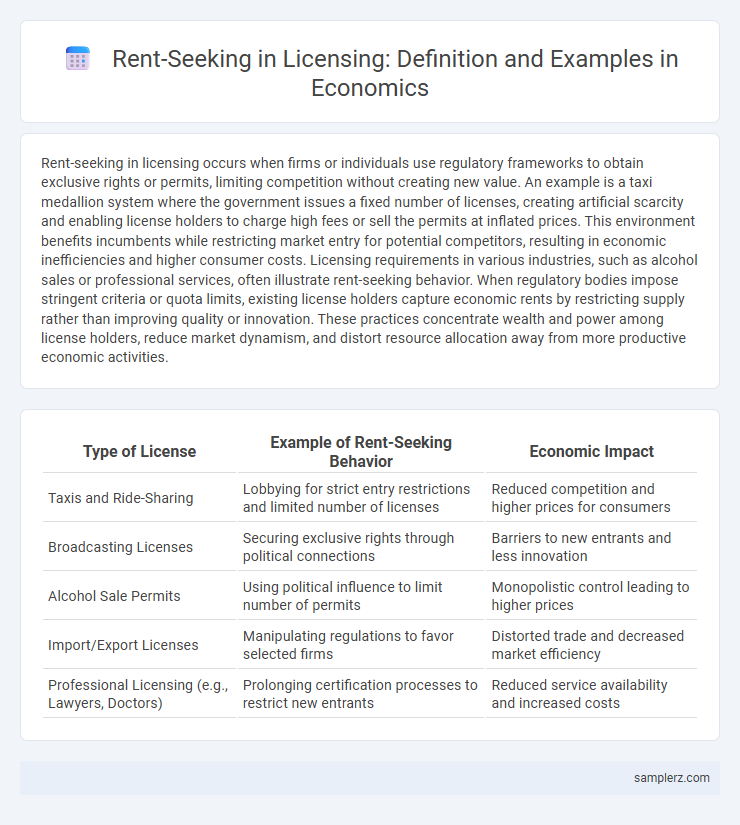Rent-seeking in licensing occurs when firms or individuals use regulatory frameworks to obtain exclusive rights or permits, limiting competition without creating new value. An example is a taxi medallion system where the government issues a fixed number of licenses, creating artificial scarcity and enabling license holders to charge high fees or sell the permits at inflated prices. This environment benefits incumbents while restricting market entry for potential competitors, resulting in economic inefficiencies and higher consumer costs. Licensing requirements in various industries, such as alcohol sales or professional services, often illustrate rent-seeking behavior. When regulatory bodies impose stringent criteria or quota limits, existing license holders capture economic rents by restricting supply rather than improving quality or innovation. These practices concentrate wealth and power among license holders, reduce market dynamism, and distort resource allocation away from more productive economic activities.
Table of Comparison
| Type of License | Example of Rent-Seeking Behavior | Economic Impact |
|---|---|---|
| Taxis and Ride-Sharing | Lobbying for strict entry restrictions and limited number of licenses | Reduced competition and higher prices for consumers |
| Broadcasting Licenses | Securing exclusive rights through political connections | Barriers to new entrants and less innovation |
| Alcohol Sale Permits | Using political influence to limit number of permits | Monopolistic control leading to higher prices |
| Import/Export Licenses | Manipulating regulations to favor selected firms | Distorted trade and decreased market efficiency |
| Professional Licensing (e.g., Lawyers, Doctors) | Prolonging certification processes to restrict new entrants | Reduced service availability and increased costs |
Understanding Rent-Seeking in Licensing Systems
Rent-seeking in licensing systems occurs when firms or individuals expend resources to obtain exclusive rights or licenses without creating new value, often leading to reduced competition and inefficiency in the market. For example, taxi medallion systems require drivers to acquire costly licenses, which can result in inflated prices and barriers to entry, favoring incumbent operators over consumers. Understanding this dynamic highlights how regulatory frameworks can inadvertently encourage rent-seeking behavior, hindering economic growth and innovation.
Taxi Medallion Licenses: A Classic Rent-Seeking Example
Taxi medallion licenses exemplify rent-seeking by artificially restricting market entry, causing prices to soar while limiting competition. Medallion holders gain economic rents by controlling access to the taxi industry, often resulting in inflated asset values disconnected from actual service quality. This regulatory barrier enables incumbents to extract wealth without corresponding productivity improvements, distorting market efficiency.
Exclusive Government Contracts and Licensing Privileges
Exclusive government contracts and licensing privileges exemplify rent-seeking by allowing firms to secure market advantages without enhancing productivity or innovation. Firms leverage these licenses to extract economic rents by limiting competition, thereby increasing their profits at the expense of overall social welfare. This behavior distorts market efficiency and reallocates resources toward lobbying efforts rather than value creation.
Pharmaceutical Patents and Licensing Barriers
Pharmaceutical patents create significant rent-seeking opportunities by granting exclusive rights that limit competition and inflate drug prices. Licensing barriers often prevent generic manufacturers from entering the market, perpetuating monopolies and stifling innovation. These practices lead to higher healthcare costs and restricted access to essential medicines worldwide.
Spectrum Licensing in Telecommunications
Spectrum licensing in telecommunications exemplifies rent-seeking where companies invest significant resources lobbying regulators to secure exclusive spectrum rights, limiting competition. These licenses create artificial scarcity, enabling incumbents to charge higher prices rather than innovate or improve service efficiency. Such practices distort market dynamics, reducing overall economic welfare and technological progress.
Import Licenses and Market Entry Restrictions
Import licenses often serve as a prime example of rent-seeking behavior, where firms expend resources to secure limited licenses rather than improving productivity or innovation. Market entry restrictions created through such licenses enable incumbents to maintain monopolistic control, leading to reduced competition and higher consumer prices. This rent-seeking activity distorts efficient allocation of resources and hampers overall economic growth.
Alcohol Distribution Licenses: Restricting Competition
Alcohol distribution licenses often serve as a prime example of rent-seeking behavior by restricting market entry and limiting competition. Companies invest resources to secure these licenses not for operational efficiency but to gain exclusive market privileges, driving up prices for consumers. This artificial scarcity creates economic inefficiencies and reduces overall market welfare by stifling innovation and limiting supply.
Professional Licensing in Healthcare Fields
Professional licensing in healthcare fields often exemplifies rent-seeking by creating barriers to entry that limit competition and increase costs for consumers. Regulatory bodies may impose stringent requirements or fees that benefit incumbent practitioners while restricting new entrants, ultimately reducing market efficiency. Such rent-seeking behavior can lead to higher healthcare prices and reduced access to medical services.
Environmental Permits as Tools for Rent-Seeking
Environmental permits often serve as tools for rent-seeking by enabling firms to secure exclusive rights or favorable conditions that limit competition and increase profits without contributing to productivity. Companies may lobby regulatory agencies to impose stringent permit requirements that act as barriers to entry, effectively creating a market where only select players can operate. This manipulation of environmental licenses generates economic inefficiencies and distorts resource allocation by prioritizing regulatory capture over sustainable policy objectives.
Rent-Seeking Behaviors in Intellectual Property Licensing
Rent-seeking behaviors in intellectual property licensing often manifest through excessive patent filing and strategic litigation aimed at blocking competitors rather than fostering innovation. Companies may use licensing agreements to impose restrictive terms or demand exorbitant royalties, creating barriers to market entry and reducing overall economic efficiency. This manipulation of licensing frameworks exploits legal protections to extract economic rents without contributing to productive activity.

example of rent-seeking in license Infographic
 samplerz.com
samplerz.com